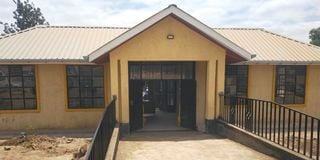Premium
Kajiado gets modern integrated learning centre for special needs pupils

The Kitengela Noonopir Primary School PWDs modern centre with a capacity for 45 special needs learners.
Dozens of physically challenged children from poor backgrounds in Kitengela town, Kajiado East Sub County, will benefit from a modern integrated learning centre at a public school.
The centre, located at Noonkopir Public Primary School, was built by a consortium of Rotary clubs from Kenya, Australia, and the Rotary District through Rotary International Donations in partnership with Mama Respond International.
All public learning institutions in the vast Kajiado County lacked friendly facilities for physically challenged pupils. At Noonkopir Primary School, the few lucky physically challenged learners were once confined to a dusty room. Most parents opted for home care for their children without formal education.
“The physically challenged learners used to sit on an old mattress in a room. They depended on their classmates to help them move around or access the washrooms. It was an arduous task for the school management until the integrated centre started operating recently," Noonkopir Primary School head teacher Peris Gitari told Nation.Africa on September 4, 2023.
She said the centre has three classes: basic, intermediate and vocational. Currently, 25 pupils are enrolled and 20 more applications are pending for a new facility with a capacity of 45 pupils.
Modern facilities
The facility cannot accommodate the high number of physically challenged learners. The building is equipped with modern facilities. The entrance has a ramp instead of stairs for easy access. All rooms have wide doors for wheelchair access. Washrooms are specially designed for disabled learners to use unassisted. All seats are adjustable to accommodate learners with special needs.
The centre, which has a computer lab and a therapy room, will cater for learners with autism, behavioural disorders, cerebral palsy and mental retardation.
During the launch of the centre on Monday (September 4, 2023), parents of special needs learners recounted the hardships they faced as they sought vacancies for their children in public schools.
Mr Leonard Ithau, who is in charge of the Rotary Clubs of Kenya, South Sudan and Eritrea, said the facility will cater for learners enrolled in the school and special care children in the neighbourhood.
"The future of our society lies in the hands of our children. Physically challenged learners have a big role to play in making the world a better place to live and this centre will be a turning point for many children," he said.
Athi River Rotary President Ms Judith Jumwa urged the government to put in place more facilities, especially in public schools, to cater for physically challenged learners," she said.
Information technology
Kitengela Rotary President Dr Daniel Wanjuki urged parents of children with special needs to enrol them for formal education. The same sentiments were echoed by Dr. Daniel Kanchori, Kitengela Rotarian, who urged the Maa community to embrace and accept children with special needs.
“A physically challenged child is not a curse. Some of these children excel in information technology, sports, and other fields. Let's not hide them at home," said Mr Wanjuki.
Noonkopir has many physically challenged children. In 2021, Nation. Africa ran a story on 54 disabled children who were left at the mercy of their mothers after the men allegedly 'left'.
Of the 54 children suffering from various disabilities in the regions, 98 per cent are under the care of a female parent. For the remaining two per cent, the male parents are said to be passive.
The parents are struggling to provide medical care and food for their children.
However, these single mothers have formed a community-based organisation known as The Tiala Foundation, which has been advocating for the rights and medical care of children with disabilities in the area.
The organisation's chairperson, Mary Wambui, said the new integrated centre will give a new lease of life to physically challenged children.
"We want national and county governments to partner with non-governmental organisations to build more integrated centres in public schools.





